




OPERATIONAL RISK MANAGEMENT IN 2024
JUNE 2024 SPONSORED BY:
HEDGE WEEK
BE PREPARED
EXECUTIVE SUMMARY
Operational risk management: three words never far from the mind of every ops leader in the hedge fund industry. Preparing for the unexpected has always been challenging in such a complex and fast-moving sector, and the pace of change is only accelerating as technology advances, working practices evolve and new regulations emerge.
This data-driven Hedgeweek report, sponsored by Derivitec, provides valuable intelligence and context to hedge fund COOs and other ops professionals, helping them stay on trend when it comes to best practices and the latest trends in the dynamic field of risk management. Using data sourced from our survey of over 70 global hedge funds, the report will provide insights into their current priorities and concerns.
Part I sets the scene, incorporating valuable insights into the pain points hedge funds face with their risk management systems and expanding on other areas beyond the investment side, from regulation to counterparty risk, which also fill COO in-trays. Part II focuses on solutions, outsourcing trends and technology factors at play in this area.
We hope you find the insights in this report valuable.
OVERVIEW HEDGEWEEK INSIGHT REPORT | JUNE 2024 | 2
WILL WAINEWRIGHT HEAD OF HEDGE FUND RESEARCH CONTENTS KEY FINDINGS SECTION 1 RISK HORIZON 4 5 SECTION 2 RISK MANAGEMENT 13 CONCLUSION 20
Breakdown of respondents to Hedgeweek’s Q2 Hedge Fund Manager Survey by firm location, size, and approach:
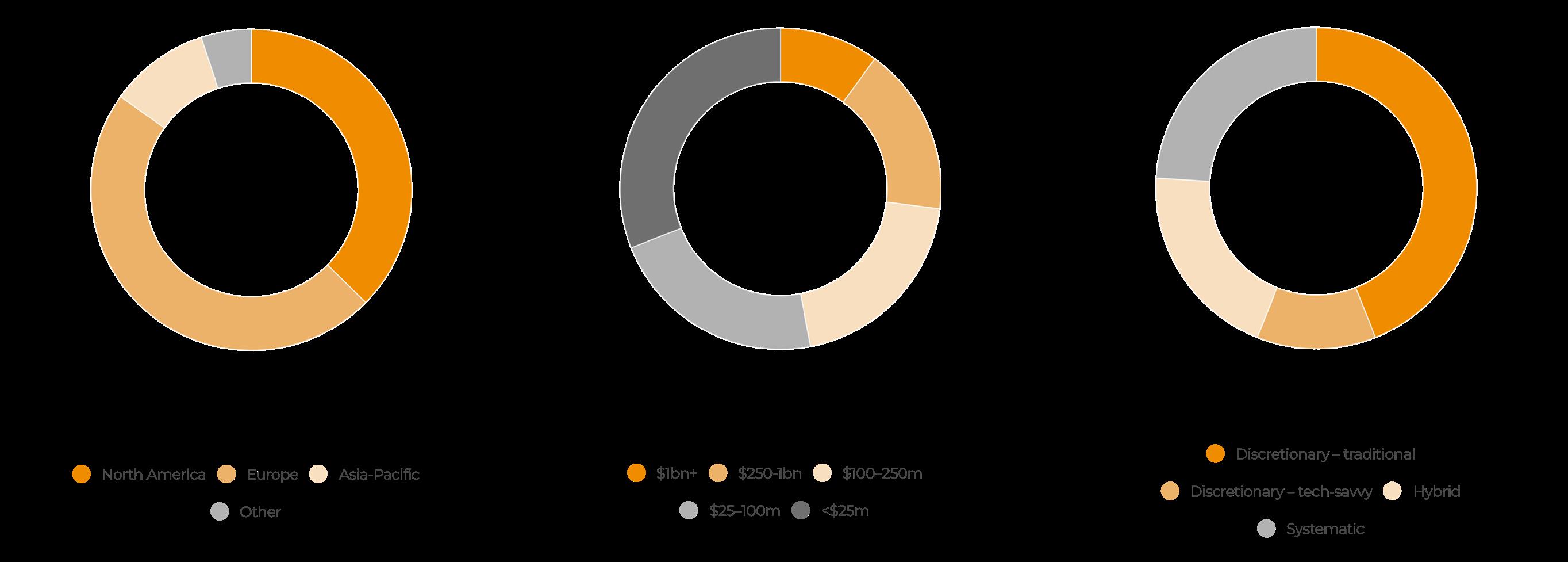
METHODOLOGY
A key source of data in this report is the results of Hedgeweek’s hedge fund manager survey conducted in Q2 2024. Further insights in this report were gathered during interviews in April and May 2024 with named and unnamed industry sources, and additional third-party research and intel.
METHODOLOGY HEDGEWEEK INSIGHTS REPORT | APRIL 2024 | 3
HQ AuM Investment style
KEY FINDINGS 1
Coverage, accuracy and transparency top issues
When it comes to trading/portfolio risk, hedge fund managers rank three key issues above the rest: coverage, accuracy and transparency. Coverage was top. Essential risk management starts with a basic question: “Does the system cope with every type of trade and product covered by the firm’s mandate?”
Industry needs better coverage
“Lack of product coverage in some of the more bespoke asset classes we trade,” was highlighted as a risk management pain point by one respondent to Hedgeweek’s survey. And that respondent was not alone, with survey data and anecdotal responses highlighting this as the main issue faced by COOs and other ops leaders in the hedge fund space. “Many larger funds are led by ex-investment bank executives who want to have the same sort of experience they had when they were working on the sell side,” says Derivitec founder George Kaye.
Outsourcing continues to be on-trend
The move to outsourcing key operational functions across the hedge fund industry is not abating. Almost a third, 31%, of respondents in Q2 said their firm is actively planning to outsource more of their business functions (up from 29% a quarter earlier). Portfolio risk management functions are now widely outsourced.
Risk management is about more than portfolio risk
For COOs and other ops leaders, risk management is about more than portfolio risk. Regulation is a frequently cited example of a major risk area which must constantly be on the radar. Recent changes, in particular T+1 US Settlement, have been highlighted as adding to the burden. But regulation is just one of ten operational risk areas highlighted by AIMA in addition to trading risk areas.
KEY FINDINGS HEDGEWEEK INSIGHT REPORT | JUNE 2024 | 4
4
3 2

OPERATIONAL RISK ASSESSMENT
Operational risk management is fundamental to stability and success in the hedge fund industry. This section explores the terrain and reveals the biggest issues COOs face in this complex area.
“Operational risk management is always top of mind for COOs,” says Phill Chapple, chief operating officer with Monterone Partners, an equities shop in London.
“The key factor to consider is that no two firms are the same. Risk management has to be unique – everybody has different strategies, different setups and requirements. At the same time it’s very hard to get firm guidance on what risk points are. So constant vigilance is key.”
Hedge fund risk management can be a confusing field, with a lack of consensus over shared approaches and best practices. Trade groups have established frameworks, notably AIMA, which categorised eight trading-related risk areas in its Guide to Sound Practices for Operational Risk Management:
and execution risk
risk
SECTION ONE: RISK HORIZON HEDGEWEEK INSIGHT REPORT | JUNE 2024 | 5
Trading
Trading
Post-trading
Trade reporting Cash movements Corporate actions and proxy voting Valuation Performance calculations
environment risk
And ten other operational risk areas:
Counterparty risk
Business conduct and reputational risk
Technology, IT and cybersecurity risk
Business continuity management
Outsourcing risks
Internal and external fraud and financial crime prevention risk
Communication risk
Legal, regulatory and compliance risk
Financial risk
Insurance
How to keep a grip on all these risks, from the front office to all other parts of the business, is a pressing question. COOs canvassed by Hedgeweek agree that robust planning and processes are key. When it comes to the investment side and specifically trading/ portfolio risk – the first eight categories above – hedge fund managers rank three key issues above the rest: coverage, accuracy and transparency (see Fig. 1.1).
Coverage – the ability to cover all products traded, regardless of complexity – was picked by 21% as their biggest issue. This was followed by accuracy (mark-to-market
1.1 What is the biggest issue in risk management that concerns you currently?
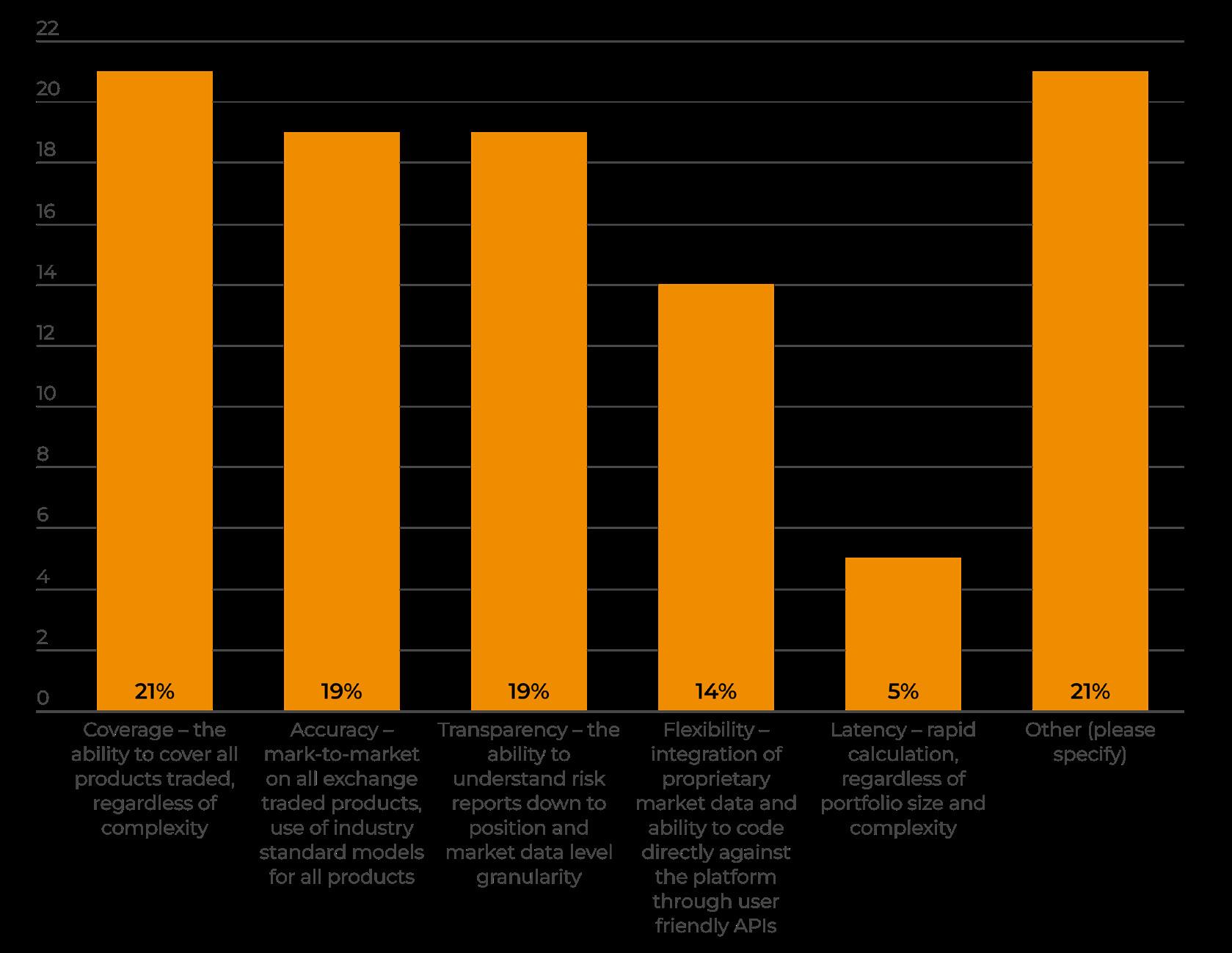
SECTION ONE: RISK HORIZON HEDGEWEEK INSIGHT REPORT | JUNE 2024 | 6
Fig.
Source: Hedgeweek Hedge Fund Manager Survey Q2 2024
“
Risk management has to be unique – everybody has different strategies, different setups and requirements.
Phill Chapple COO with Monterone Partners
OVERVIEW PRIVATE EQUITY WIRE INSIGHT REPORT FEBRUARY 2023 | 7
Fig. 1.2 When deciding on a risk management system, what are your top three requirements? (select max 3 options)
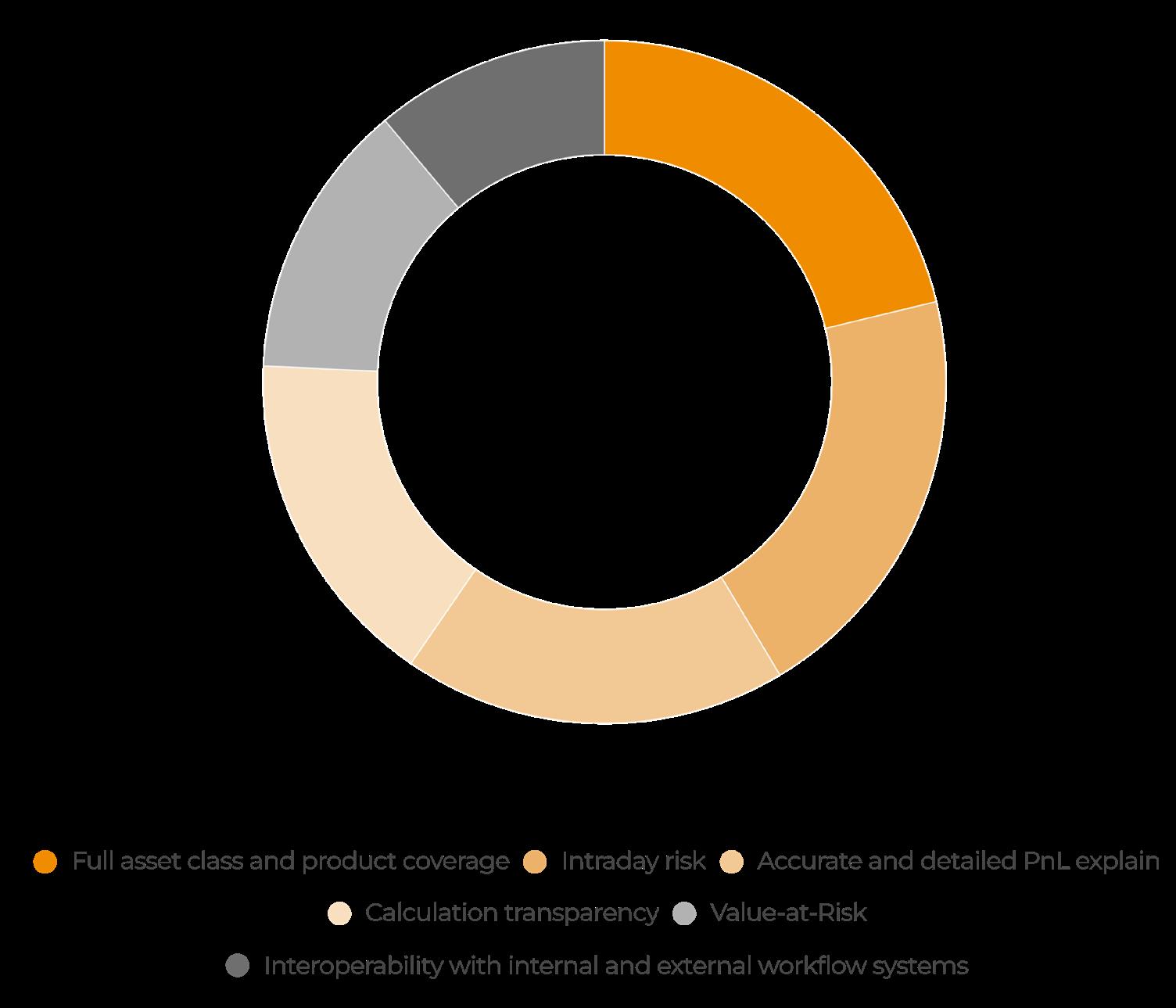
Source: Hedgeweek Hedge Fund Manager Survey Q2 2024
on all exchange traded products, use of industry standard models for all products) and transparency (the ability to understand risk reports down to position and market data level granularity), tied on 19%.
The pre-eminence of these three choices among hedge fund respondents reflects their importance to COOs. Chapple describes this as the “business as usual” element of risk management.
“Those three cover [it] completely,” says Chapple. “If I’m looking at ops systems or ops risk, does it cover anything that could happen in the portfolio? So for example, does the system cope with every type of trade and product covered by the firm’s mandate.”
Flexibility – the integration of proprietary market data and ability to code directly against the platform through user friendly APIs – was next on 14%.
Risk management flexibility tends to be more important for the bigger firms, says George Kaye, CEO and founder at Derivitec. “Smaller and emerging firms will tend to use an out-ofthe-box solution.
“PMs might use a platform to see risk numbers ticking away, responding immediately to new trades and large market moves. Risk departments tend to use APIs to do in depth analysis on a post trade basis, unlimited by the display constraints of an application. In our experience the larger firms do both.”
SECTION ONE: RISK HORIZON HEDGEWEEK INSIGHT REPORT | JUNE 2024 | 8
When selecting a risk management system, three requirements emerged as most important: full asset class and product coverage; intraday risk; and accurate and detailed PnL explanation (see Fig. 1.2).
To help form a fuller picture of their requirements, respondents were invited to share the pain points experienced with their current risk management system. Expense was named as an issue by more than one emerging fund. A lack of automation and unsophisticated processes were also highlighted: “Integration between the outsourced execution management system and risk management system is always a pain point. Developing automation between the two is critical.”
This selection of answers shows how coverage, accuracy and valuation were highlighted in different ways by respondents:
“Lack of product coverage in some of the more bespoke asset classes we trade.”
“Updated versions causing incorrect results in previously tested products.”
“Changes made to an API without informing me beforehand.”
“Precise PnL explain to discover potential trading and algo errors in a systematic quant strategy.”
“Consistent PnL calculations and marks in line with client methodologies.”
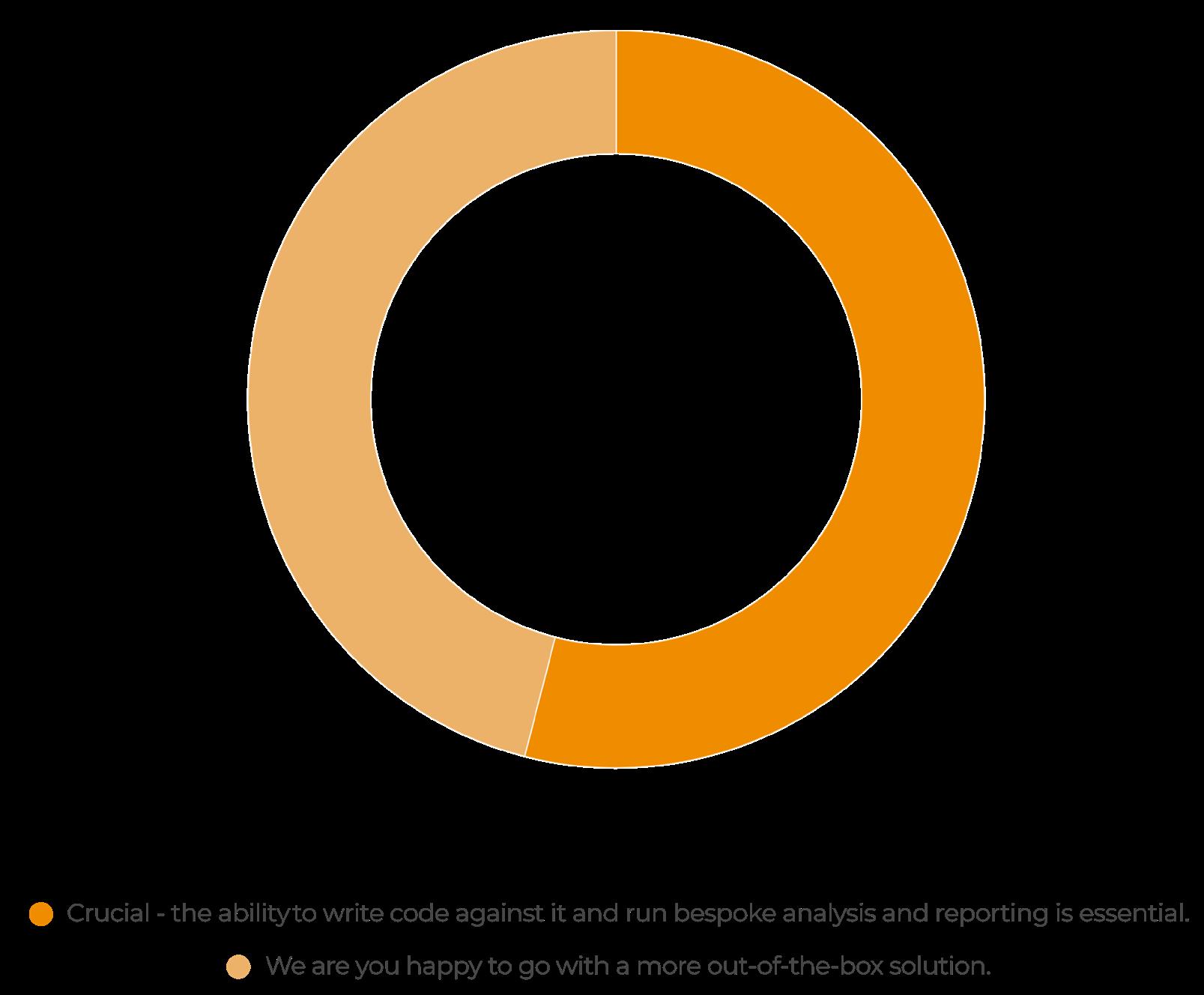
SECTION ONE: RISK HORIZON HEDGEWEEK INSIGHT REPORT | JUNE 2024 | 9
Fig. 1.3 How important is flexibility of the risk management system to you?
Q2 2024
Source: Hedgeweek Manager Survey
Coverage, accuracy and transparency are top three issues in risk management
Source: Hedgeweek Manager Survey Q2 2024. Coverage was picked as top issue by 21%, followed by accuracy and transparency, level on 19%. 1ST 2ND
Accuracy
Mark-to-market on all exchange traded products, use of industry standard models for all products
Coverage The ability to cover all products traded, regardless of complexity 2ND
Transparency
The ability to understand risk reports down to position and market data level granularity
OVERVIEW PRIVATE EQUITY WIRE INSIGHT REPORT | FEBRUARY 2023 | 10 KEY FINDING
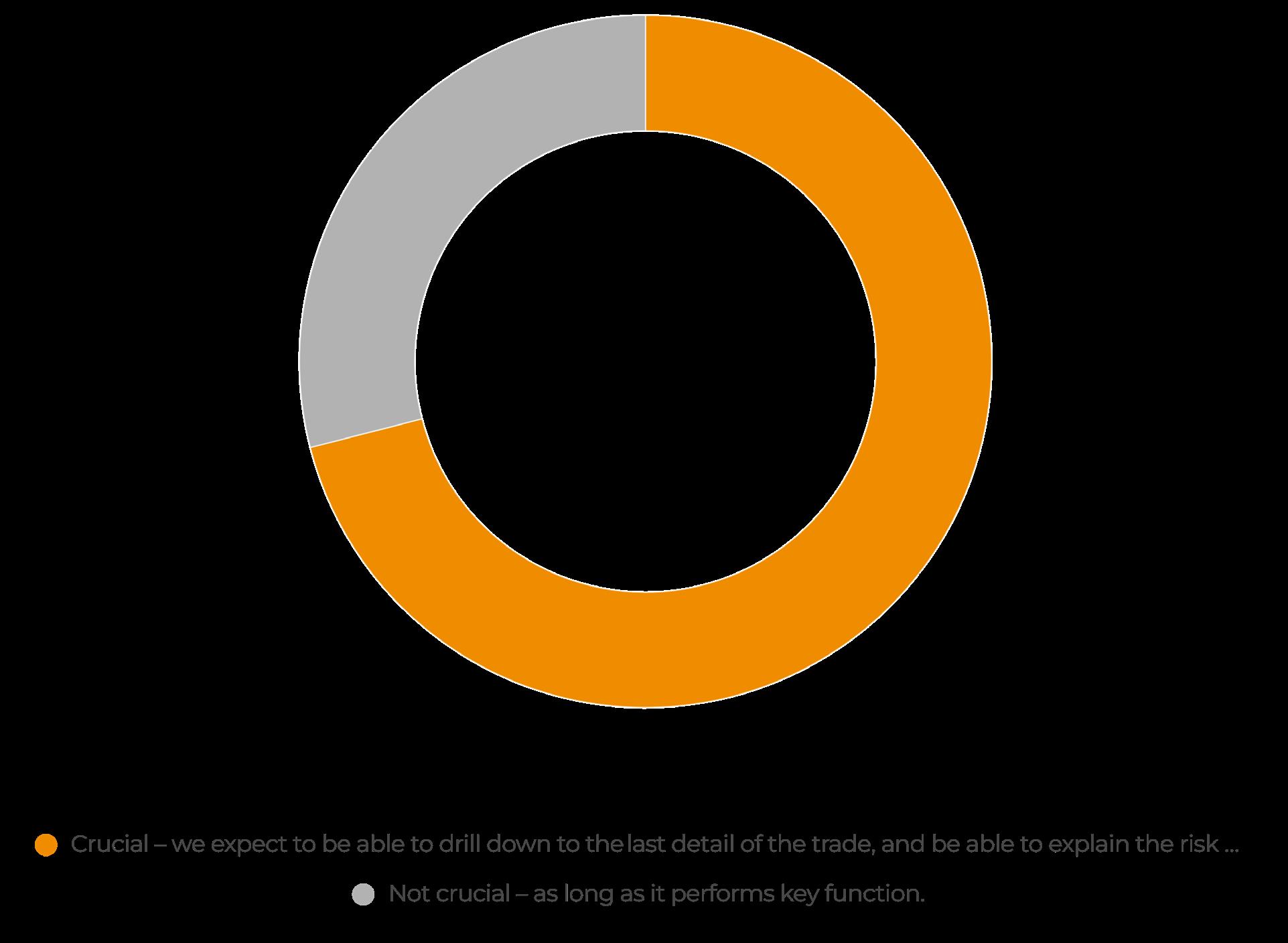
“Risk management is only as good as the inputs/forecasts and inputs/forecast are often wrong. How do you account for this while still accepting enough risk to make a meaningful return?”
“Mainly T+1 reporting rather than live data.”
“Mostly issues with non-linear products but that is about to be addressed.”
“Coverage of OTC products being limited and cumbersome.”
“Lack of product coverage in some of the more bespoke asset classes we trade.”
Respondents were asked for more details on their views on flexibility and transparency. More than half, 54%, said flexibility of their risk management system was crucial: the ability to write code against it and run bespoke analysis and reporting is essential (see Fig. 1.3). The remaining 46% were happy to go with a more out-of-the-box solution.
As Kaye noted, this was more important for the larger firms, with just 29% of sub-$500m firms saying it was crucial.
Transparency was seen as more crucial across all firms, with 71% expecting to be able to drill down to the last detail of the trade, and be able to explain the risk on positions in acute detail (see Fig. 1.4). Just 29% were content as long as it performs key functions.
SECTION ONE: RISK HORIZON HEDGEWEEK INSIGHT REPORT JUNE 2024 | 11
Fig. 1.4 How important is analytical transparency of the risk management system to you?
Source: Hedgeweek Manager Survey Q2 2024
Operational risk management is about more than portfolio risk. “You’ve got to consider what happens if we do anything differently,” adds Chapple. “And that’s where I put regulation – not what happens today, but what could happen. The good service providers are on top of this, and they come to you and tell you what to change ahead of time. Where you have problems is where you have a provider who just doesn’t understand that or they’re behind the curve.”
“Recent changes, like T+1 US Settlement, mean you have to have your eyes on the ball more, because you don’t have the extra day to ensure everything is correct.”
The financial markets industry will need to adapt to new US regulations requiring a transition to a compressed settlement cycle from two business days after the trade date (T+2) to one business day (T+1), from May 2024. Front office systems on the buyside will need to be ready worldwide for the change.
Industry participants must ensure their technology and internal operations - and those of their counterparties – can accommodate the change. Counterparty risk, which came to the fore during the global financial crisis, should not be overlooked (see box out).
One COO mentioned that understanding and measuring operational risk is made more difficult by the fact that a lot of relevant incidents where things go wrong are never disclosed publicly. Firms affected by, for example, incorrect reconciliation will know internally and should let their investors know what has happened, but they will often be kept under wraps. A good indicator of what’s been going wrong in the background can be fines from regulators, especially the SEC fines, which can be quite sizable to firms not meeting their regulatory duties of control or other failures.
Focus on: counterparty risk
The set of ten additional operational risk management areas categorised by AIMA range from regulation to insurance to reputation, and much else besides.
Counterparty risk became a key focus after the collapse of Lehman Brothers during the financial crisis, heralding the normalisation of the multiprime model.
“Post-Lehman saw the big move to multi-prime as the operational risk focus moved to counterparties risk, and the fears around understanding rehypothecation,” explains Chapple.
“Where are your assets and how safe they are? Where are they actually held? In whose name are they held? And then that’s really where a lot of the controls came.”
There was renewed talk about counterparty risk in a prime brokerage context when Credit Suisse was taken over by UBS, but it is a factor to consider across the service provider spectrum –illustrating how unexpected events can throw up new risks and issues to consider. Constant vigilance is a wise mantra for ops professionals to work by.
SECTION ONE: RISK HORIZON HEDGEWEEK INSIGHT REPORT JUNE 2024 | 12
CONSTANT VIGILANCE
Section one outlined the operational risk management landscape and key issues facing hedge fund ops leaders. This section will explore the practical applications.
Operational risk management has never been more important. “The continued need for sound practices has grown, especially with the use of alternative data, cyber security threats and data breaches and operational risk lapse at global banking institutions,” said trade group AIMA in the second edition of its guide to sound practices in ORM.
“Following this trend, institutional investors and ORM specialists continue to state that the efficiency of operational risk management is a top priority.”
A key question facing hedge fund COOs across a range of functions, not least portfolio risk management, is often whether to build your own system, outsource entirely or a combination of the two.
“It varies across the industry,” says Phill Chapple of Monterone Partners. “Normally, it’s a mixture, because even you have an outsourced system, you need to put a control
process around it to make sure it’s been monitored and documented.”
More than a quarter (28%) of the Hedgeweek survey respondents had already implemented a managed service solution covering the risk management function, while 48% had developed an in-house solution (see Fig. 2.1). The remaining 24% were in the process of doing so.
This level of in-house development was more prominent among smaller and emerging funds who may be yet to make a decision or allocate budget for outsourcing. It also reflects the new skill-sets of many hedge fund professionals.
“There’s a whole new generation of people coming through with advanced coding skills. And they have the skills to build their own stuff,” says Chapple.
But he warns: “That can be quite dangerous, because that works until it doesn’t, or that

SECTION 2: RISK MANAGEMENT HEDGEWEEK INSIGHT REPORT JUNE 2024 | 13
Fig. 2.1 Do you currently have a managed service solution for risk management?
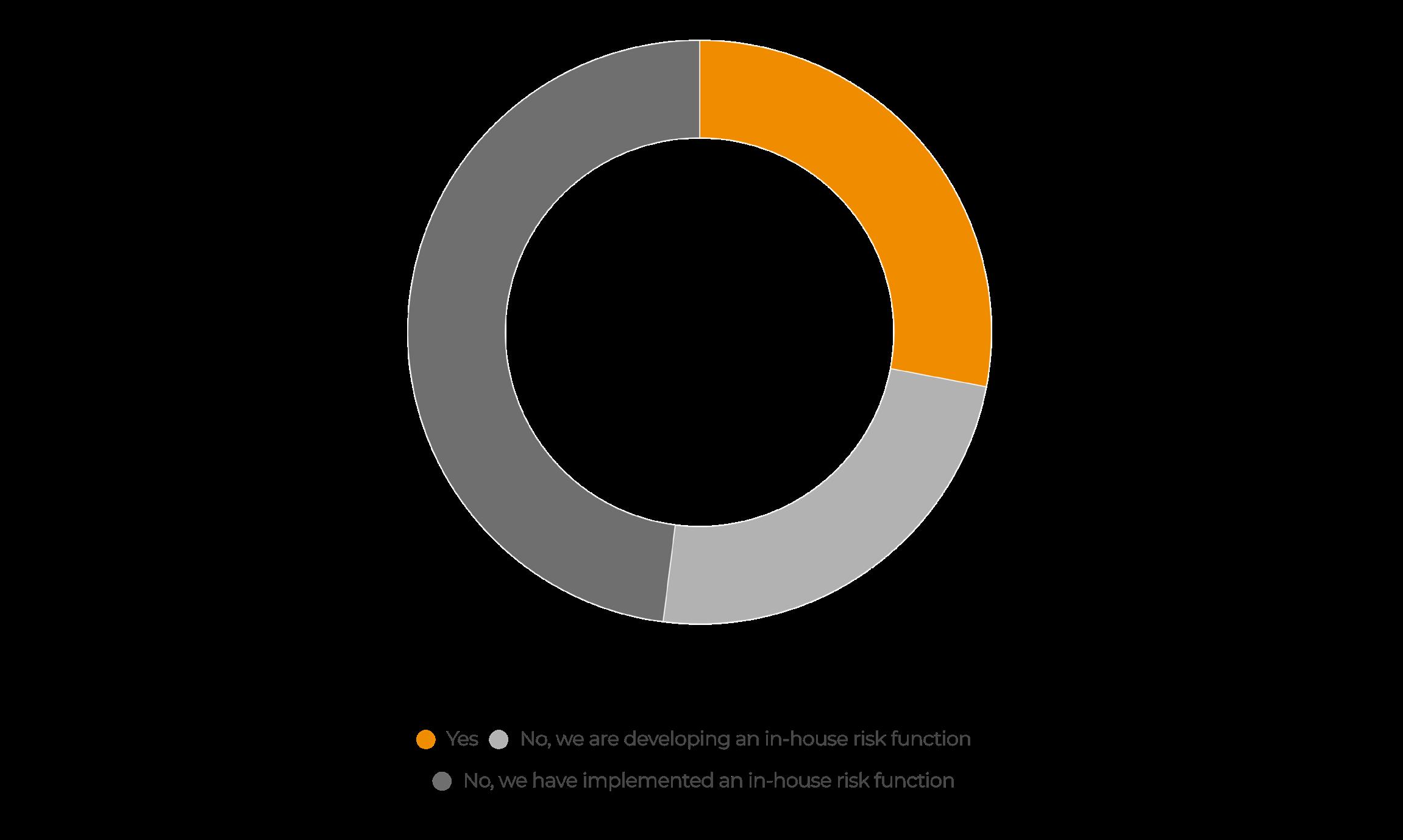
Source: Hedgeweek Manager Survey Q2 2024.
person leaves (key person risk). All it takes is one line that’s out or it doesn’t work for a particular situation, and you’ve got serious issues that might not ever be picked up or until it’s a real problem.”
The trend towards outsourcing looks set to continue, with 31% of respondents in Q2 saying their firm is actively planning to outsource more of its business functions (up from 29% in the Q1 survey). A further 16% were undecided (see Fig. 2.2).
Another aspect to consider is the fact that outsourcing parts of the front office would have been far less likely – or acceptable to investors – in years gone by, but there has been increasing adoption and is now seen as the next step in outsourcing’s evolution.
When deciding whether to appoint a third-party to fulfil a business function, “outsourcing the work, but never the responsibility” is an oftenheard industry mantra.
“The key is to ensure the right partner is chosen and that firms have sufficient oversight of their outsourced providers – the process may be outsourced but the responsibility for it cannot be,” as Ken Hope, COO at Aspect Capital, told Hedgeweek last year.
“Trust and transparency with these providers is extremely important, and if these things can’t be established then that could act as a blocker to a firm’s plans to implement an outsourcing model.”
SECTION 2: RISK MANAGEMENT HEDGEWEEK INSIGHT REPORT JUNE 2024 | 14
“
Many
larger funds are led by exinvestment bank executives who want to have the same sort of experience they had when they were working on the sell side.
George Kaye CEO and founder, Derivitec
OVERVIEW PRIVATE EQUITY WIRE INSIGHT REPORT | FEBRUARY 2023 | 15

Source: Hedgeweek Manager Survey Q2 2024
That sentiment reflects not just common sense but the regulatory scene. As the FCA notes in its latest guidance: “Firms who use outsourced and other third-party service providers should take responsibility for managing risk arising from those arrangements.
“Greater levels of risk management are needed when a firm increases its dependence on outsourced and third-party service providers. This includes the delivery of services that could affect the firm’s ability to remain authorised. The risks of potential harm from operational disruption can change over time and firms should manage it accordingly.”
There is acceptance across the industry of the benefits of outsourcing, not just in terms of the high-quality solutions available, but the timesavings aspect, particularly in the automation of key processes which free up time wasted on manual processes, especially at smaller and emerging firms with leaner headcounts.
There is continuous review of in-house technology, evenly spread across the front office (30%), middle (27%) and back (32%) which shows appetite to make change when needed (see Fig. 2.3).
It is no surprise that hedge funds lead the way among asset managers in pursuing best-inclass technology and outsourced solutions. A lot of the industry is led by personnel with an investment banking background, who want the same access to data and insights as they previously enjoyed, which can often only be provided by specialists rather than developed
SECTION 2: RISK MANAGEMENT HEDGEWEEK INSIGHT REPORT JUNE 2024 | 16
Fig. 2.2 Is your firm actively planning to outsource more of its business functions?
Outsourcing appetite on the rise – especially Asia-Pacific
Percentage of firms actively planning to outsourcing more of its business functions?
North America Europe Asia



Source: Hedgeweek Manager Survey Q2 2024
OVERVIEW PRIVATE EQUITY WIRE INSIGHT REPORT | FEBRUARY 2023 | 17 KEY FINDING
35% 26% 60%
in-house (see box out interview with George Kaye, page 19).
The use of alternative data has been a hot industry topic in recent years, and has relevance to risk management. Can the use of alt data help improve risk management and compliance models? Many think so. For 23% of firms which have been using alt data for five years or more, the answer is yes, according to a survey by AIMA and SS&C (see Fig. 2.4).
Artificial intelligence is also playing an increasingly important role. Almost a tenth (9%) of firms managing at least $1bn are using generative AI tools in the realm of risk analysis, according to a 2024 AIMA survey.
And 32% of respondents to the AIMA survey said operational processes would be impacted by growing use of generative AI in the next two years.
“We have had success with our own in-house Gen AI tools as well as the plethora of tools available on the market, with a small cross functional team leading the rest of the business in exploring them across multiple operational areas,” said Derek Hardiman, chief technology officer at Abbey Capital in a contribution to the report.
ChatGPT, a language model developed by Open AI capable of understanding and generating human-like text, is by far the most popular AI tool, used by 66% of AIMA’s hedge fund respondents to help with their work.
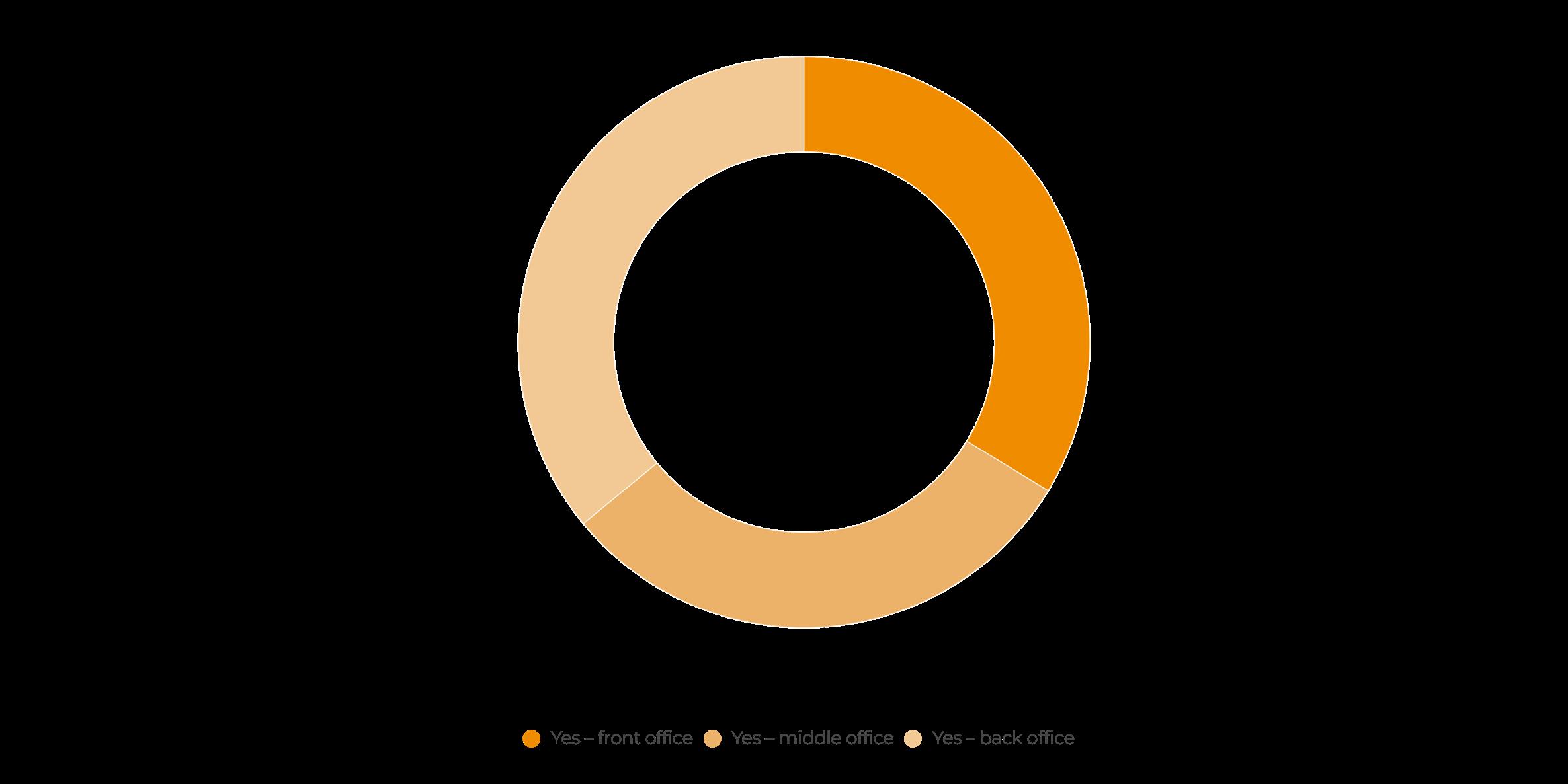
SECTION 2: RISK MANAGEMENT HEDGEWEEK INSIGHT REPORT JUNE 2024 | 18
Fig. 2.3 Is your firm actively reviewing its in-house technology?
Source: Hedgeweek Manager Survey
Q2 2024
 GEORGE KAYE CEO and founder, Derivitec
GEORGE KAYE CEO and founder, Derivitec
Why are coverage and accuracy such major concerns for managers when it comes to risk management?
Accuracy is critical and always will be. Many of the queries we get from our clients relate to small differences compared to other sources. Even the slightest difference will be explored. Coverage is equally important for modern hedge funds, especially the larger firms. One of the biggest problems we discuss with clients and prospects about risk management systems is that they just can’t book everything they want to in the system, either because it takes too long for the developers to create a trade entry screen for the trade, or because the vendor simply can’t model it. It is important to turn these things around quickly. Many larger funds are led by ex-investment bank executives who want to have the same sort of experience they had when they were working on the sell side.
Transparency was also important, the ability to understand risk reports down to position and market data level granularity, but lagged other choices.
As vendors, we would like to think that transparency level and ease of use is one of our many selling points. Being able to understand, clearly, why trades are priced as they are, and why the risk on them is as calculated, is key to anyone trading more complex products.
The top three requirements when deciding on a risk management system were intraday risk; accurate and detailed P&L explanation; and full asset class and product coverage.
That sums up the whole remit in risk management. Live or intraday risk is a very difficult thing to do well, having all manner of market data and calculation latency issues, but getting this right is a key focus for us, along with complete product coverage across all the major asset classes.
Fig. 2.4 Can the use of alternative data help improve risk management and compliance models?
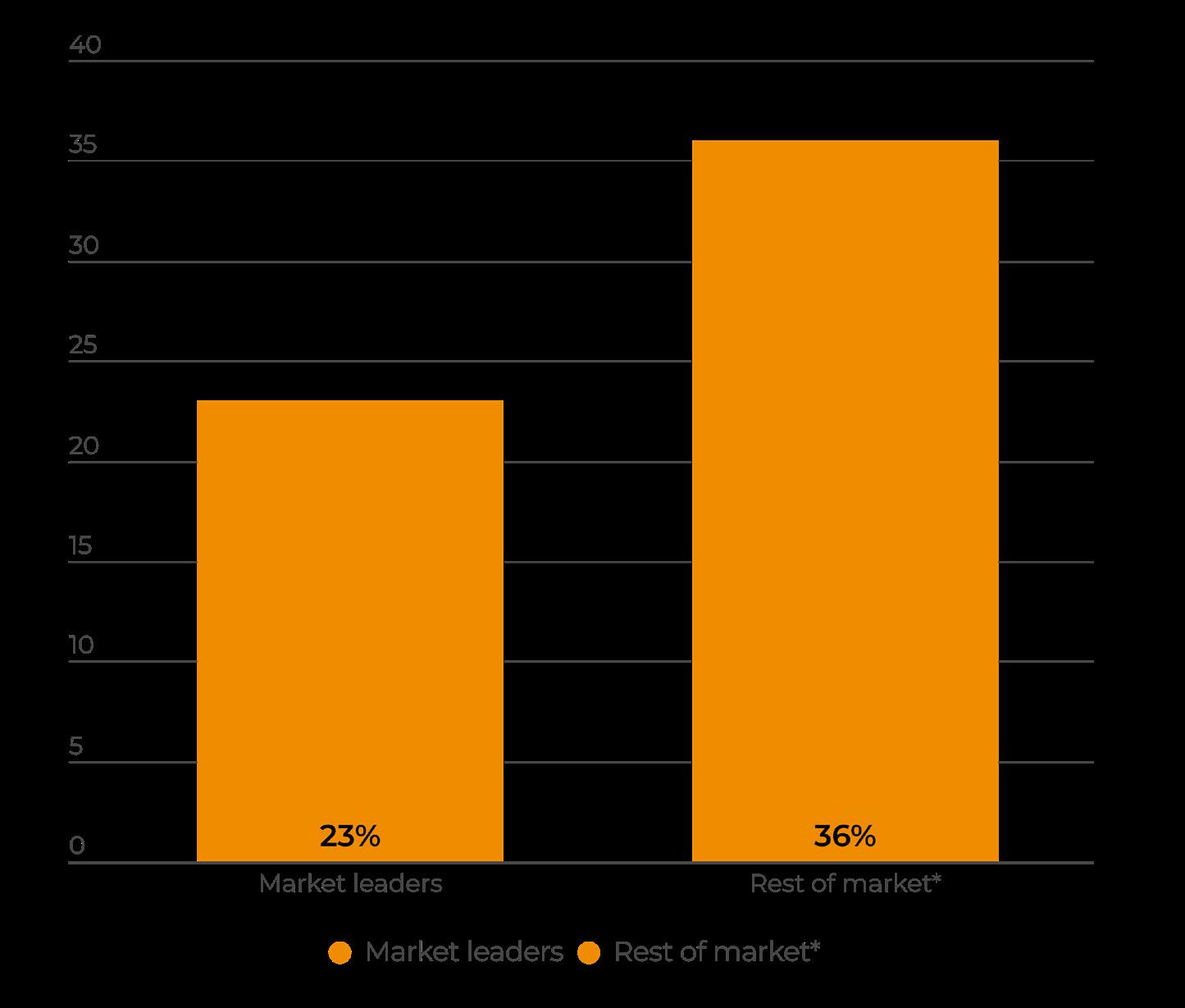
Source: Aima/SS&C survey: CASTING THE NET How Hedge Funds are Using Alternative Data (2021). *Market leader means 5+ years of alt data usage.
SECTION 2: RISK MANAGEMENT HEDGEWEEK INSIGHT REPORT JUNE 2024 | 19
CONCLUSION
“Be prepared” and “constant vigilance” – the headline and recurring theme of this report underline the caution and defensiveness so salient in the field of operational risk management.
But it is also an opportunity. Hedge funds which have the most effective practices in place will be best-placed not just to protect against risks which routinely come up in the field of trading, but also to deliver the efficiency which acts as a strong foundation for maximising alpha. In many ways, a strong defence is the best form of offence.
This report revealed coverage, accuracy and transparency as the main three issues for hedge funds building risk management systems, whether internally or with the support of an outsourced provider. These three themes are pertinent not just on the trading side but for other areas of operations, from compliance to counterparties – indeed, a key takeaway from this report is that this trio should underpin hedge funds’ approach to operational risk management in general.
Just as all asset classes should be covered, all risks should be considered. Just as systems should deliver 100% accuracy, there is no room for error. And just as a risk management system is only as effective and useful as it is transparent, all risks should be dealt with openly within a firm. Those principles can be a baseline to guide effective operational risk management.

CONCLUSION
HEDGEWEEK INSIGHT REPORT JUNE 2024 | 20
CONTRIBUTORS:
Will Wainewright
Head of Hedge Fund Research will.wainewright@globalfundmedia.com
Johnathan Glenn Head of Design johnathan.glenn@globalfundmedia.com
FOR SPONSORSHIP & COMMERCIAL ENQUIRIES:
Ince Saleem Chief Revenue Officer ince.saleem@globalfundmedia.com

HEDGE WEEK
Published by: Global Fund Media, Fox Court, 14 Gray’s Inn Road, London, WC1X 8HN © Copyright 2024 Global Fund Media Ltd. All rights reserved. No part of this publication may be reproduced, stored in a retrieval system, or transmitted, in any form or by any means, electronic, mechanical, photocopying, recording or otherwise, without the prior permission of the publisher Investment Warning: The information provided in this publication should not form the sole basis of any investment decision. No investment decision should be made in relation to any of the information provided other than on the advice of a professional financial advisor. Past performance is no guarantee of future results. The value and income derived from investments can go down as well as up HEDGE WEEK

















 GEORGE KAYE CEO and founder, Derivitec
GEORGE KAYE CEO and founder, Derivitec


